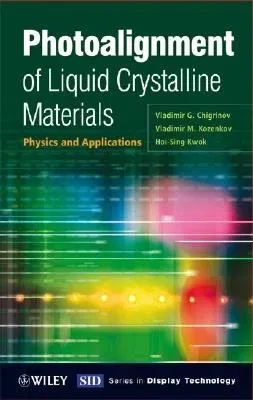Photoalignment possesses significant advantages in comparison with the
usual 'rubbing' treatment of the substrates of liquid crystal display
(LCD) cells as it is a non-contact method with a high resolution. A new
technique recently pioneered by the authors of this book, namely the
photo-induced diffusion reorientation of azodyes, does not involve any
photochemical or structural transformations of the molecules. This
results in photoaligning films which are robust and possess good
aligning properties making them particularly suitable for the new
generation of liquid crystal devices.
Photoalignment of Liquid Crystalline Materials covers state-of-the-art
techniques and key applications, as well as the authors' own diffusion
model for photoalignment. The book aims to stimulate new research and
development in the field of liquid crystalline photoalignment and in so
doing, enable the technology to be used in large scale LCD production.
Key features:
- Provides a full examination of the mechanisms of photoalignment.
- Examines the properties of liquid crystals during photoalignment, with
particular reference made to the effect on their chemical structure
and stability.
- Considers the most useful photosensitive materials and preparation
procedures suitable for liquid crystalline photoalignment.
- Presents several methods for photoalignment of liquid crystals.
- Compares various applications of photoalignment technology for in-cell
patterned polarizers and phase retarders, transflective and micro
displays, security and other liquid crystal devices.
Through its interdisciplinary approach, this book is aimed at a wide
range of practising electrical engineers, optical engineers, display
technologists, materials scientists, physicists and chemists working on
the development of liquid crystal devices. It will also appeal to
researchers and graduate students taking courses on liquid crystals or
display technologies.
The Society for Information Display (SID) is an international society,
which has the aim of encouraging the development of all aspects of the
field of information display. Complementary to the aims of the society,
the Wiley-SID series is intended to explain the latest developments in
information display technology at a professional level. The broad scope
of the series addresses all facets of information displays from
technical aspects through systems and prototypes to standards and
ergonomics

